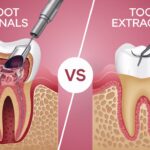Factors Influencing Early Dental Implant Failures
This article highlights some common dental implants problems and some possible causes of dental implant failure.
The dental implant procedure is known to be one of the highly recommended if not highly recommended tooth replacement methods available to patients with missing tooth/teeth. Though expensive, it is very reliable and durable with a high success rate – about 97 percent.
Notwithstanding the many benefits of the dental implant, it has its associated dental implants problems and dental implant failure is one of them. Some recent research showed that the rate of dental implant failure is about 5 percent and this is due to several reasons which are related to poor oral maintenance and hygiene practices. Visiting your dentist office near me is mandatory to determine the causes of early implant failure and find immediate dental solutions. However, patients may sometimes experience late tooth implants problems too.
Early Tooth Implant Problems
As stated above, one of the major dental implants problems is early dental implant failure and it is usually witnessed by patients after about three to four months of the dental implant surgery. During this period, osseointegration (integration of the implant with your jawbone) should be taking place.
Listed below are some of the causes of early implant failure:
Autoimmune Disease: This is a medical condition whereby the immune system of the body attacks itself and destroys other tissues in the body. An autoimmune disease can increase the likelihood of your body rejecting a tooth implant. Patients with an autoimmune disease are subjected to a higher rate of dental implant failure compared to patients without it. Some autoimmune diseases include type 1 diabetes, multiple sclerosis, celiac disease, rheumatoid arthritis, and lupus, etc.
Poor Blood Supply: For any treatment site in the body to heal up faster, there must be a sufficient supply of blood to the site, otherwise the healing process will be slowed down. This is also applicable to dental implant surgery sites. Poor or inadequate blood supply to the treated area after the dental implant surgery can cause tooth implants problems.
Medications: Some medications can also trigger tooth implants problems. For instance, if you take drugs like bisphosphonates after the implant surgery, you may experience dental implants problems. Though bisphosphonates are used for treating osteoporosis, it can also impede the success of your dental implant. Hence, it is very important to discuss your medications and supplements, both past and present, with your dentist who will take necessary proactive steps to guarantee the success of your dental implant.
Poor Health: Both poor oral and general health can cause early implant failure. If you do not follow proper oral health care practices, the success rate of your dental implants problems may be impeded. More so, poor health will generally lead to a lower integration rate of dental implants with the body.
Infections: Another major cause of dental implants problems is dental infection. A common dental infection known as peri-implantitis can lead to both early and late dental implant failure. Peri-implantitis can occur at any time – from the time of the implant surgery to several months after. If peri-implantitis is diagnosed as the cause of dental implant failure, and implant replacement must be carried out. Other dental infections include gingivitis, periodontal disease, etc. Autoimmune diseases, smoking, and poor oral hygiene practices can lease to infection.
Implant Overloading: Dental implant procedure usually follows two stages and may take several months to be completed. The first stage usually involves inserting the dental implant into the jawbone while the second stage involves attaching the abutment and the prosthetics (dental crown, dental bridge. etc.). Though a sufficient time frame is required between each stage, sometimes both stages may be conducted simultaneously in a procedure known as “one-day implant procedure” or “immediate loading.” Immediate loading requires less care after the implant surgery, shortens the dental implant treatment time, and encourages quicker recovery. However, it sometimes leads to implant overloading whereby too much pressure is exerted on the jawbone, abutment, and crown. This condition may lead to dental implant failure.
Rejection of Foreign Body: Though this occurs in rare cases, it is possible. Your body may see the tooth implant as a foreign body and, therefore, reject it and its integration. If this happens, it will impede the success of the tooth implant.
Allergic Reaction: Some patients may develop allergies to the dental implant material. Most dental implants are produced with titanium alloy, which may contain small bits of nickel. This can trigger some allergic reactions in some patients in the form of tingling sensation or burning sensation. This may result in tooth implant problems.
Nerve or Tissue Damage: During the dental implant surgery, it is possible that some nerves or tissues were damaged. Such damages can cause early dental implant failure.
Late Tooth Implant Problems
As stated above, late tooth implant problems may also occur in patients. These problems are usually experienced between one to ten years after the implant surgery. Some causes of late dental implant failure include:
Under-Engineered/Poor Dental Implant Procedure: This occurs if the surgical procedure is handled by an inexperienced or unprofessional dentist or oral surgeon and the implant is poorly fitted or does not provide enough strength to support the prosthetics. This will definitely cause the implant to fail eventually. Only a well-experienced and professional emergency dentist knows the necessary number of dental implants to avert late dental implant failure.
Smoking: Several studies have shown that smoking increases the rate of late dental failure. For instance, the rate of late dental implant failure among smokers is higher compared to non-smokers. The studies showed that smoking increases late implant failure by about 6.5 percent and 20 percent. If you are a smoker, it is advisable that you stop smoking so that you may have sound all-embracing dental health.
Bruxism (Teeth Grinding): If you grind or clench your teeth constantly, chances are that you would experience dental implant failure. This is because bruxism causes misaligned teeth, stress, additional pressure, missing teeth, among others. Bruxism can make the integration of the dental implant with the jawbone very difficult. If you suffer from bruxism, inform your dentist before your implant procedure.
Lack of Jawbone: You need sufficient bone in your jaw to support the dental implant. Lack of bone in the jaw can cause dental implants problems as there wouldn’t be sufficient bone to support the implant.
If you feel that your dental implant is failing, don’t hesitate to consult your dentist near me as soon as possible.















